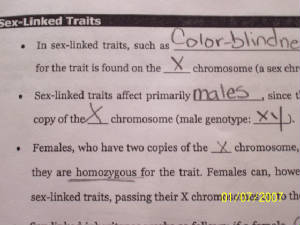|
I am familiar with the content that I teach to my students. I am able to adapt learning materials to fit the needs
of my students because of my familiarity with the content and the curriculum. The first artifact displayed here depicts
one of the note-taking devices that I devised for my students. I provided my students with a pre-constructed outline
on which they took classroom notes. The pre-constructed outline lays the foundation for my students to learn and practice
good note-taking skills. My students do not have to write down everything that is discussed in class because the materials
that I create for them guide them as to what is important. In this way, they are provided with a structured method for
recording important information that is covered in class.

I have included a copy of my class syllabus below in order to demonstrate my familiarity with the units that are covered
in the Biology curriculum. The breakdown of the syllabus, including the detailed discussion of the class grading policy
and the re-assessment/re-teaching policy indicate that I am not only familiar with the content, itself, but that I also have
a very organized and pragmatic approach to teaching it to my students.
BIOLOGY: CLASS EXPECTATIONS
OVERVIEW: WELCOME TO BIOLOGY!
The goal of Biology is for students to understand the complexity of the living world, including the functions
and processes of organisms, their interactions with one another in the environment and to respect the living world. Organisms
are linked in a complex balanced web of life. The biological traits encoded in DNA explain both the diversity and the similarity
of organisms. The relationships between structure and function are important and can be found at all levels with in an organism.
Biological processes occur in all organisms, from simple to complex. Organisms can evolve over time due to the interactions
of genetics and the environment. Organisms maintain genetic continuity through sexual and asexual reproduction. A variety
of teaching strategies are used to promote inquiry, including laboratory experiments, demonstrations, direct instruction,
current events, visual presentations, cooperative learning, as appropriate to the lesson and prior knowledge of the students.
UNITS OF STUDY
|
Semester A |
Semester B |
|
Unit |
Summary Statement |
Unit |
Summary Statement |
|
Chemistry of Life |
Investigate the properties of biologically important compounds through guided and directed inquiry investigation. |
Inheritance |
Explore fundamentals of inheritance by examining cellular processes. |
|
Cells in Living Things |
Study similarities and differences between prokaryotic and eukaryotic cells, modes of locomotion and movement, transport,
and forms of cell reproduction. |
Applied Genetics |
Explore Mendelian inheritance, principles of molecular biology, implications of applied genetics on individuals, society
and the environment. |
|
Energetics |
Develop an understanding of energetics, the study of the flow of transformation of energy in biological systems. |
Evolution |
Explore fundamentals of biological evolution through laboratory simulations and research of historical studies. |
|
Nucleic Acids and Protein Synthesis |
Explore similarities and differences between the structure and function of DNA and RNA. |
Systems in Living Things |
Explore the anatomy and physiology of systems in living things, and relationships among systems within organisms. |
|
Ecology |
Investigate the interdependence of diverse living organisms and their interactions with the components of the biosphere. |
Systematics |
Explore taxonomy and nomenclature. |
Grades:
Grades will reflect individual achievement of the MCPS Standards for each specific marking period. They will be reported
and calculated using percentages within weighted categories
- Grades are reported on a percentage scale as follows:
- The recorded quarter letter grades will be based on the following scale:
- 90%-100% = A
- 80%-89% = B
- 70%-79% = C
- 60%-69% = D
- 0%-59% = E
- Grading categories include:
- Tests (30%)
- Quizzes (20%)
- Homework Completion (10%)
- Classwork / Homework / Laboratory (25%)
- Inquiry project (15%)
Late Work and Missing Work:
- Each assignment will have a due date. This is the date by which you are expected to submit the assignment. Your
grade will drop one letter grade (10%) if it is not turned in by the due date.
- The deadline is the last day an assignment will be accepted for a grade. Work that is attempted, with a good
faith effort, and turned in by the deadline will receive no lower than a 50%.
- Work not turned in by the deadline will be considered missing.
- Missing work will be recorded in the grade book as a 0%.
- The late work deadline will be the day in which the missed assignment is passed back to the class or otherwise
specified by the teacher.
Reteaching
We are committed to students and their learning. Reteaching occurs when teachers or students determine that students are
not meeting learning goals. Teachers will determine the method and schedule to provide "extra help".
Reassessment
- Reassessments are available for quizzes and other homework / classwork assignments at the discretion of the teacher. Students
will be notified in advance of work that may be reassessed.
- If an assignment is determined to be reassessable, all students will be eligible for reassessment regardless of the grade
on the original assignment provided they have met the requirements determined by the course team.
- In order to be eligible for reassessment students must do the following:
- Attempt the initial task in good faith
- Complete a reteaching activity as determined by the teacher
- Completed any relevant homework / classwork / lab work activities associated with the reassessment
- Scores earned on the reassessment will REPLACE the original score.
- Assessments that indicate a final measure of learning may not be reassessed. (i.e. End of unit assessments, final
papers, final projects, culminating performances, final exams)
Extra Credit: There will be no extra credit.
Communication
- Progress Reports / Interims
- Report Cards
- Edline: www.Edline.net
- Science department phone number: 301-840-3968
- E-mail:
Ellen Polster: (Room D208)
- STEP: Monday & Friday 11:00-11:40
- After School by appointment: Tuesday & Thursday 2:15-3
Go to Standard III
|
